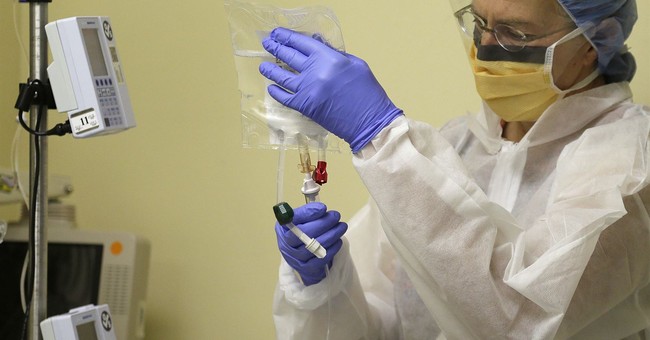
Posted on 06/12/2019 4:30:53 AM PDT by Kaslin

9jhSoon, some of you will try to make "better babies."
Already, people pay labs to examine embryos so they can pick ones with DNA they like. Some screen for gender or eye color. Some screen out certain diseases.
So far, they've been limited to selecting genes that exist in the parents. They haven't designed genes. But that is about to change.
Chinese scientists recently altered DNA in human embryos.
The designed babies -- twin sisters -- were born with immunity to common strains of HIV, claims the scientist responsible. (The added gene might also shorten lifespans. Most scientists say it's too soon to gene-edit humans safely.)
"He was put under house arrest ... and the Chinese are right to punish that scientist," says Sheldon Krimsky of Tufts' medical school in my new video.
Most Americans agree.
In one STAT-Harvard poll, 83% said creating more intelligent or stronger babies via gene-editing should be illegal.
"Of course they say that," says Georgetown philosophy professor Jason Brennan. "When you have any kind of intervention into the body that's new, people think it's icky. And they take that feeling of 'ickiness' and they moralize and think it's a moral objection."
Those intuitions threaten medical innovation, says Brennan.
Jenna Bush Hager, daughter of the 43rd president, voiced her moral concerns on Megan Kelly's TV show. She asked, "I mean where does it stop? There should be things that we leave up to God."
"I'm not sure I'm going to take her word for it." scoffs Brennan. "If God appears before me and says, 'Don't do this,' I'll stop."
But why would God say stop?
We already give our kids music lessons, braces, tutoring, karate lessons -- any advantage we can. Why not also give them better genes?
Imagine, says Brennan, a world where people are much smarter -- maybe smart enough to avoid wars, to take us easily to other planets and to do other things we can't even imagine.
"Maybe we'll turn them into X-Men," he says, referring to the mutant superheroes in films like the just-released "Dark Phoenix."
It would be good to have real X-Men around, saving lives.
Another objection to "customizing" babies is that at first only rich people will be able to pay for it. "This is going to be a new way to create disparities in wealth," says Krimsky.
Brennan counters that you could say this about most new things.
"Every bit of technology that we enjoy today follows the same pattern. You look in your automobile, and you have a CD player or an MP3 player and a GPS. ... All of these things, when they first became available, were incredibly expensive. ... The rich pay the infrastructure to develop the technologies, and then they spread ... become commonplace for everybody to have."
While the rich do often get there first, they also pay for the expensive failures, and they help fund the technologies that get everyone else there second.
Rich people got airplane travel and Lasik surgery first, but I wouldn't want those things banned because of that. A free, competitive market is the best way to ensure prices come down.
"Even if the price came down for this," claims Krimsky, "it would create more injustice."
I accused Krimsky of being an old fuddy-duddy who likes serving on government committees and fears change. In the '70s, he opposed in vitro fertilization.
"I love change!" he responded. "But ... there are some things we shouldn't be fiddling around with."
Most countries' governments agree. They've banned creation of designer babies.
But it's going to happen anyway.
The U.S. bans sale of kidneys, observes Brennan, but "that doesn't mean people don't buy kidneys. They just go and buy them elsewhere."
Banning designer baby technology, he predicts, "will just guarantee that it will be available only to the super-rich and only to the politically well-connected."
I think Brennan's right. Designed babies are coming. If not here, then the genetic engineering will happen in India, Africa, somewhere.
The U.S. shouldn't keep this technology from those of us who want to give it a try.
Our descendants should have the right to use science to make themselves all that they can be.
Hey Stossel, remember the Master Race and Eugenics?
You’re bringing it back.
Moron.
Genes usually alter many atibutes, not just one. There is going to be a lot of failures before this gets anywhere good.
This psycho has never observed human behaviour, has he? Khan Noonien Singh comes to mind.
Eugenics makes a come back ...
Genes usually alter many atibutes, not just one.
_______________________________
“(The added gene might also shorten lifespans. Most scientists say it’s too soon to gene-edit humans safely.)”
Dr. Ian Malcolm : Yeah, yeah, but your scientists were so preoccupied with whether or not they could that they didn’t stop to think if they should.
Nowadays,there’s a gene for everything. If they can screen-out the gay gene that every leftist is sure exists, parents won’t have to worry about their kids coming home from college married to someone of the same sex. Or fearing that the local Catholic priest is paying too much attention to their son.
Old Nazi: We have waited so long...Overman, you had come at last!
Miracleman; Yes. You can go now. *BONE CRUSHING NOISES*
Interesting thread title and subject matter. All in the timing (and gene crossing), people seeking the ideal person in all the wrong places.
That’s because they are trying to create him. Truth is always stranger than fiction. God’s order is intrinsically functional, unlike this weird stuff derived from vain imaginations and ulterior motives and worse.
X marks the spot: where this kind of nonsense needs to stop.
You are talking about a Party that was willing to kill tens of millions of their own people in order to secure power.
We will now find out how many lives they are willing to expend in order to secure a global competitive advantage.
“Our descendants should have the right to use science to make themselves all that they can be.”
Our descendants aren’t the ones making the choice to use science to change themselves into ‘all that they can be’. Their forbears would make that choice, the people living now. As far as I can tell they change embryos.
I think I know the changes many elite would like to make in their general populations—less aggressive, less intelligent, more susceptible to suggestion and the dictates of the authorities. To create a population that can’t even conceive of how they are repressed.
Freegards
If your in-utero baby tested poz of Cystic Fibrosis, a lethal condition involving just one wrong nucleotide, wouldn’t you want to snip it out..?
“But God WILLED you to die..!” —it rings just soooo hollow.


We're changing already, whether we want to or not. For every pretty girl who becomes a beautiful bride, we're using sexual selection to change if not our abilities then at least our appearance.
Who controls this? What, no one? Should it be controlled?
We are changing. We should change. We need to get smarter, with better memories. To become healthier, with longer lives; we need to better fit the challenging environment the Future has in store for us.
We are currently at the stage we were in agriculture about ten thousand years ago, just finding out what works to improve the yield; what cultivars improve disease resistance and drought tolerance. But what good is food without people to consume it?
There will be an appetite for beneficial changes. There will be a black market to supply the changes needed. Perhaps this will be the reparation needed to balance out the former black market we all abhor so vehemently.
We will change. We are changing, and we will continue changing. We Neanderthals will just have to get with the program and adapt to it.
The stars await, but the journey will be long.
No, they should not "have the right." They do not "have the right." They have the wrong.
However, I find it entirely likely that they will do it anyway, but I won't be there to see them get what's coming to them.
Odd to see you and I apparently on disparate sides on this issue. Let’s see where we stand, eh?
Heinlein covered this topic in “Revolt in 2100”. His was a more optimistic version of Huxley’s “Brave New World”. In Heinlein’s story, there were “control naturals”, people who had not been modified or improved in regard to their genetic make-up, health, intelligence, and so forth. Such people sometimes unintentionally outed themselves by sneezing or coughing, a behavior almost unheard of in the world of 2100.
It’s worth the read, just to get a rather unbiased viewpoint expressed by the author, as well as a rollicking story to go along with it.
Heinlein himself was annoyed with the frailties of the human condition, especially after it started affecting him personally. I tend to agree with that.
You see, you can be almost perfectly healthy and still be plagued by minor issues such as kidney stones, or gout, or even more serious issues like an incipient aneurysm.
Some people might say they want to have a good-looking corpse, but I find that to be an entirely wasteful concept.
It takes only a small thing to take us down; our Goliath ambitions and sterling qualities brought down by the pebbles cast by vengeful Davids disrespectful of our personal magnanimity.
I am personally convinced that our lives are far too short. While it is currently fashionable to speak derisively of superannuated teenagers among us, the more tragic reality is that our true maturity is far too short. In precious few words “We grow too soon oldt und too late schmart.”
If this be true, for me, for Robert Heinlein, and for many out among our conversant audience, then perhaps, God willing, our modern-day science will continue its march to whittle away at our infirmities of age, and we will one day grow somewhat schmart before we get too oldt.
My main point of objection with the article is that I do not think we will ever have sufficient knowledge to work with genetic material without causing the intended beneficiary more harm than good. Just using our current main tool, selective breeding, we find that the animals on whom we experiment end up with a host of genetic problems when we attempt to select for a single factor we consider "positive."
Your point about a too-short period of functional maturity is well taken. On the other hand, there's a case to be made that wisdom accrues when things really start to hurt and you memento mori.
Disclaimer: Opinions posted on Free Republic are those of the individual posters and do not necessarily represent the opinion of Free Republic or its management. All materials posted herein are protected by copyright law and the exemption for fair use of copyrighted works.